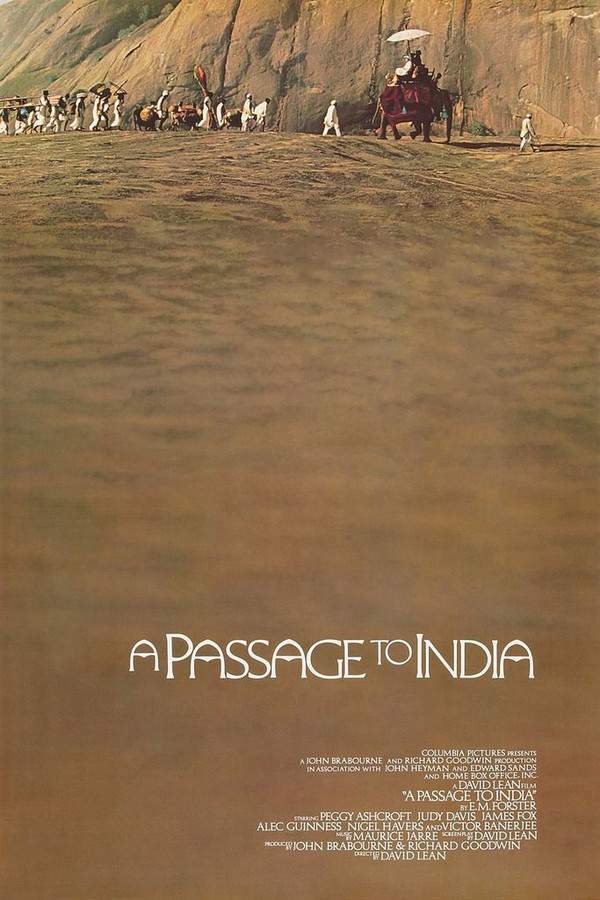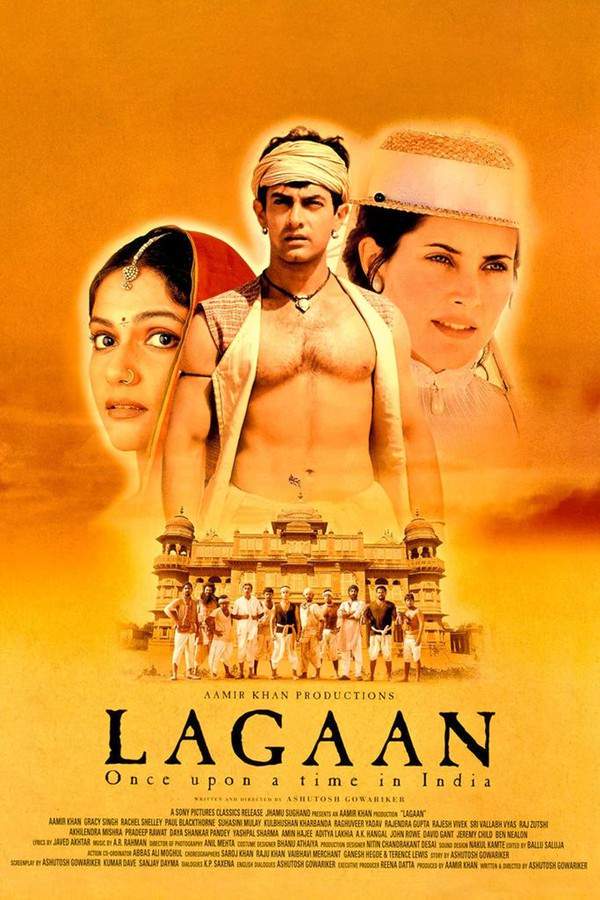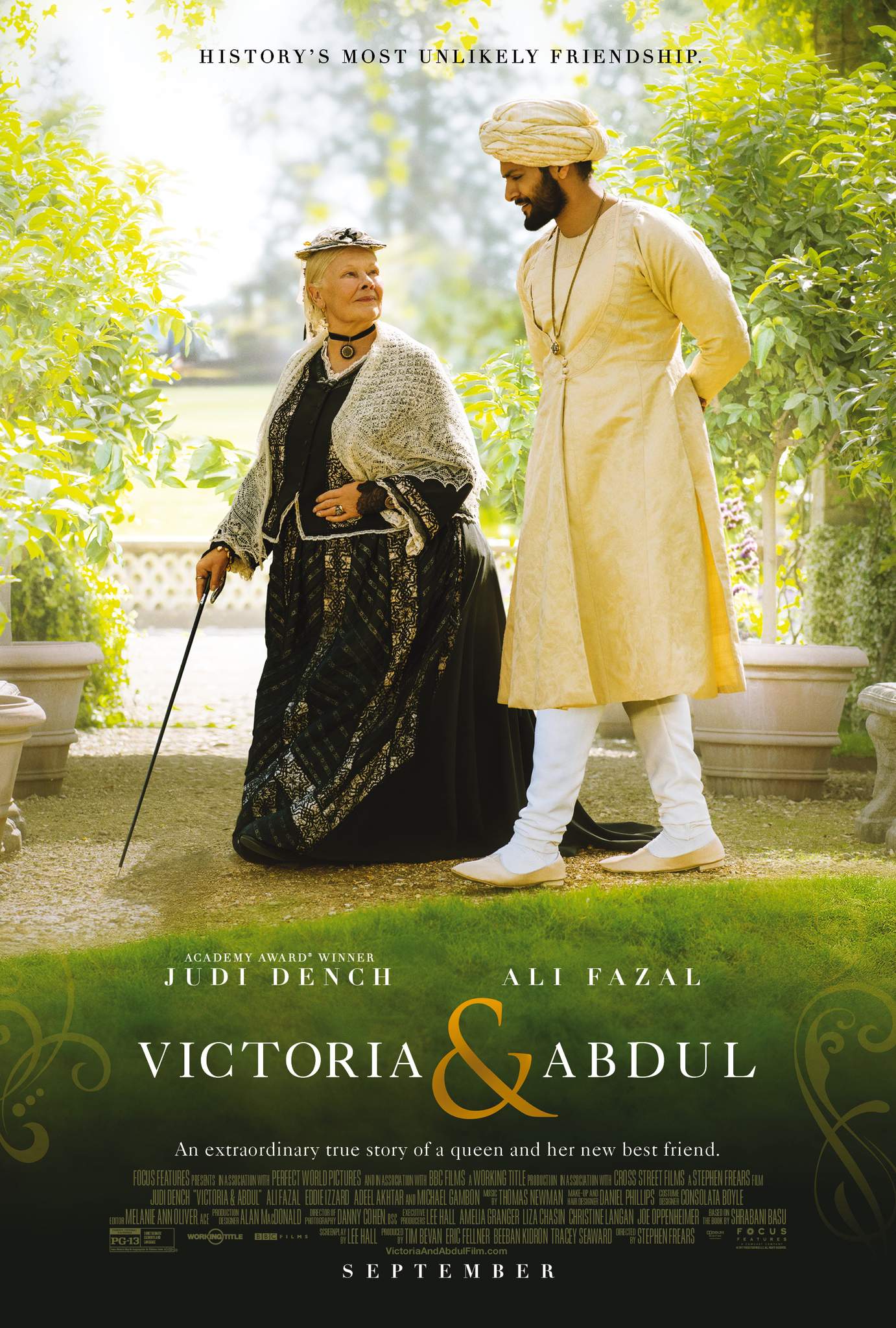
A Passage to India 1985
Directed by

David Lean
Made by

Columbia Pictures
Test your knowledge of A Passage to India with our quiz!
A Passage to India Plot Summary
Read the complete plot summary and ending explained for A Passage to India (1985). From turning points to emotional moments, uncover what really happened and why it matters.
Adela Quested, portrayed by Judy Davis, embarks on a journey from England to the British Raj in India, accompanied by Mrs. Moore, played by Peggy Ashcroft. Mrs. Moore is the mother of Adela’s intended husband, Ronny Heaslop, who is portrayed by Nigel Havers. Heaslop holds a position as the city magistrate in Chandrapore, and Adela hopes to evaluate whether she can adapt to her new life in India. Mrs. Moore plans to return home after a few weeks, while Adela has opted for an open-ended ticket, allowing her to stay for an indeterminate amount of time.
Upon arrival in Bombay, the ladies undertake a long land journey of approximately 1,000 miles to reach Chandrapore. Among their fellow travelers is Collector Turton, depicted by Richard Wilson, who is Ronny’s superior. Turton is accompanied by his wife, Mrs. Turton, portrayed by Antonia Pemberton. Disappointment soon sets in for Adela and Mrs. Moore as they realize that the British community is distinctly isolated from the Indian population, amidst the rising tide of the Indian independence movement in the 1920s. Adela feels a growing discomfort seeing how Indians are treated, as they are met with suspicion and disdain from the British citizens. Mrs. Moore expresses her disbelief at this prejudice against fellow humans, further complicating their acclimatization.
During their stay, Mrs. Moore serendipitously meets Dr. Aziz Ahmed, played by Victor Banerjee, at a local mosque, where his surprise at her kindness seems to initiate a connection that transcends racial boundaries. Aziz, a widower, is friends with Ali, portrayed by Art Malik, and is also closely associated with Advocate Hamidullah and Begum Hamidullah, who are portrayed by Saeed Jaffrey and Dina Pathak, respectively.
Encouraged by school superintendent Richard Fielding, who is depicted by James Fox, Adela and Mrs. Moore have the chance to meet the eccentric Professor Narayan Godbole, portrayed by Alec Guinness. Fielding introduces Aziz to the ladies, leading to an invitation to explore the local Marabar Caves. This led to a series of events where Aziz tries to organize a memorable excursion for the ladies. However, Ronny reacts harshly to any interaction Adela has with Indians, prompting her to reconsider her engagement to him.
As the narrative unfolds, Aziz must manage logistics for the excursion while his internal turmoil grows. After a reflective bike ride, Adela finds herself in a confusing emotional state, ultimately deciding to embrace her feelings for Ronny, marking their engagement. However, on the day of the planned visit to the caves, chaotic mismanagement leads to a fragmented group.
As Adela and Aziz delve into the caves, the atmosphere grows tense. Soon after, Adela becomes disoriented, leading to a debilitating incident as she flees, leaving Aziz to grapple with the sudden turn of events. Following the chaos, accusations arise, with Aziz wrongfully accused of a heinous act against Adela, which shatters the fragile peace between the British and Indian communities.
With the trial and revelations, Mrs. Moore insists on Aziz’s innocence but ultimately departs for England with a heavy heart, leaving behind the escalating tension. With her own condemning accusation retracted under duress, Adela’s journey leads her to a place of introspection, far from the life she envisioned in India.
After the trial unfolds and the truth comes to light, Aziz is vindicated, stepping away from colonial ties to pursue a new path in Kashmir. Adela, now marooned by her own community, is cared for by Fielding, who eventually finds love with Stella Moore, Mrs. Moore’s daughter from a later marriage. The narrative concludes with Aziz and Fielding reconciling and a promise of understanding, as Aziz reaches out to Adela, seeking forgiveness for the misunderstandings rooted in their tumultuous past.
A Passage to India Timeline
Follow the complete movie timeline of A Passage to India (1985) with every major event in chronological order. Great for understanding complex plots and story progression.
Adela's Journey Begins
Adela Quested travels from England to the British Raj in India, accompanied by Mrs. Moore, the mother of her intended husband, Ronny Heaslop. This journey marks the beginning of Adela's quest for adaptation to a new life and culture in a foreign land.
Arrival in Bombay
Upon reaching India, Adela and Mrs. Moore arrive in Bombay, where they prepare for a long and arduous journey of approximately 1,000 miles to the town of Chandrapore. Their arrival sets the stage for their exploration of the British-Indian dynamic in the region.
Encounter with Collector Turton
While traveling to Chandrapore, Adela and Mrs. Moore meet Collector Turton and his wife, who are part of the British community. This meeting introduces them to the hierarchical structure of British society in India and its segregation from the local population.
Cultural Isolation Realized
As they settle in Chandrapore, Adela and Mrs. Moore quickly recognize the stark isolation of the British from the Indian community during a time of rising independence sentiments. Adela's discomfort grows as she witnesses the prejudices and disdain with which Indians are treated by the British.
Mrs. Moore Meets Dr. Aziz
At a local mosque, Mrs. Moore meets Dr. Aziz, and their interaction fosters a connection that challenges the racial boundaries of the British Raj. Dr. Aziz is taken aback by her kindness, marking a pivotal moment in their understanding of each other.
Introduction to Professor Godbole
School superintendent Richard Fielding introduces Adela and Mrs. Moore to the eccentric Professor Narayan Godbole. This introduction opens the door for further cultural exploration and interaction with the local Indian community.
Plans for Marabar Caves
Aziz takes on the task of organizing an excursion to the Marabar Caves for Adela and Mrs. Moore, aiming to create a memorable experience. However, Ronny's disapproval of any interaction between his fiancée and the Indians complicates matters.
Adela's Emotional Conflict
After contemplating her relationship with Ronny following a reflective bike ride, Adela struggles with her feelings and ultimately decides to accept her engagement to him. This decision signifies her internal conflict regarding identity and belonging in India.
Chaos at the Marabar Caves
On the day of the excursion to the Marabar Caves, disarray ensues, resulting in a fragmented group. As Adela and Aziz venture deeper into the caves, an unsettling atmosphere begins to envelop them, foreshadowing the impending chaos.
Adela's Disorienting Experience
Inside the caves, Adela becomes increasingly disoriented and panicked, leading her to flee in distress, abandoning Aziz and the group. The incident ignites a series of tumultuous events that will forever alter the relationships between the British and Indian communities.
Accusations Against Aziz
In the wake of Adela's distress, Aziz faces wrongful accusations of a grievous act against her, threatening to shatter the fragile peace between the British and Indian populations. This sudden turn of events escalates tensions and highlights colonial prejudices.
Mrs. Moore's Departure
Mrs. Moore, amidst the turmoil, insists on Aziz's innocence but ultimately resolves to return to England, burdened by the escalating tensions. Her departure symbolizes the divide and her failed hopes for mutual understanding during her time in India.
Adela's Introspection
After retracting her condemnatory accusation under pressure, Adela embarks on a journey of introspection, grappling with her choices and the reality of her life in India. The harsh truth forces her to reevaluate her understanding of herself and her surroundings.
Aziz's Vindication
Following the trial and revelation of the truth, Aziz is ultimately vindicated, enabling him to step away from colonial ties and pursue a new beginning in Kashmir. This outcome not only restores his honor but also offers a glimpse of hope for reconciliation.
New Beginnings
In the aftermath, Fielding tends to Adela as she navigates her new reality, while also finding love with Stella Moore, Mrs. Moore's daughter from a later marriage. The narrative concludes with instances of reconciliation and a promise of understanding between Aziz and Fielding, symbolizing the potential for a new hope.
A Passage to India Characters
Explore all characters from A Passage to India (1985). Get detailed profiles with their roles, arcs, and key relationships explained.
Adela Quested
Adela Quested is a young Englishwoman who journeys to India in search of purpose and adventure. As she grapples with cultural dissonance and personal turmoil, her character embodies the conflict between old-world expectations and new-world realities. Her evolving feelings toward both Ronny and India shape her transformative journey.
Mrs. Moore
Mrs. Moore is a compassionate and open-minded figure who contrasts starkly with the prevailing prejudices of her time. Her bond with Dr. Aziz signifies a desire for understanding and connection across cultural divides, aiming to see beyond the colonial attitudes of her fellow Britons. Her departure symbolizes the weight of these issues as they remain unresolved.
Dr. Aziz Ahmed
Dr. Aziz is a young Indian physician who embodies hope for bridging cultural divides. He is charismatic yet troubled by the harsh realities of colonial life, struggling with his identity amidst rising tensions. His friendship with Adela and Mrs. Moore becomes a poignant aspect of his character, highlighting the challenges of genuine connection across cultural barriers.
Ronny Heaslop
Ronny Heaslop, the British magistrate, represents the colonial authority and its accompanying bias. His protective nature toward Adela is overshadowed by his adherence to societal norms, which challenge their relationship. This internal conflict places him at the center of the narrative's tension, as his worldview clashes with Adela's evolving understanding of India.
Professor Narayan Godbole
Professor Godbole is an eccentric character who embodies the complexities of Indian identity during this turbulent time. His philosophical insights and unique perspective provide a contrast to the colonial attitudes surrounding him. He serves as a bridge between cultures, encouraging understanding and dialogue amid tension.
A Passage to India Settings
Learn where and when A Passage to India (1985) takes place. Explore the film’s settings, era, and how they shape the narrative.
Time period
1920s
The 1920s in India marked a period of unrest as the Indian independence movement gained momentum against British colonial rule. This decade was characterized by growing tensions and rising awareness of social injustices faced by local populations. It was a time when cultural exchanges were fraught with misunderstandings and prejudice, reflective of broader global shifts and changes.
Location
Chandrapore, Bombay, Marabar Caves
Chandrapore serves as a microcosm of colonial India, illustrating the stark divide between British settlers and the local Indian populace. Bombay, a bustling metropolis, represents the gateway to India, brimming with cultural and historical significance. The Marabar Caves embody a mysterious and significant site, serving as the backdrop to pivotal events that challenge social boundaries.
A Passage to India Themes
Discover the main themes in A Passage to India (1985). Analyze the deeper meanings, emotional layers, and social commentary behind the film.
🌍
Cultural Clash
The film explores the profound cultural divides between the British and Indian communities during the colonial period. Characters face challenges that stem from their differing beliefs, social norms, and prejudices. This clash serves as a catalyst for personal and external conflicts, illuminating the broader societal tensions of the era.
💔
Identity and Belonging
Adela's journey is anchored in her struggle for identity and belonging amidst a foreign culture. As she navigates her feelings towards Ronny and the conflicting societal pressures, the theme of personal discovery is woven throughout the narrative. Ultimately, the characters’ search for connection and understanding against societal expectations underscores the complexities of human relationships.
⚖️
Justice and Misunderstanding
The film delves into the themes of justice and the misinterpretation of actions amidst racial tension. Aziz's wrongful accusation highlights the fragility of truth in a prejudiced environment, challenging notions of morality and justice. The trial serves as a pivotal moment, questioning the integrity of colonial structures that fail to protect the vulnerable.

Coming soon on iOS and Android
The Plot Explained Mobile App
From blockbusters to hidden gems — dive into movie stories anytime, anywhere. Save your favorites, discover plots faster, and never miss a twist again.
Sign up to be the first to know when we launch. Your email stays private — always.
A Passage to India Spoiler-Free Summary
Discover the spoiler-free summary of A Passage to India (1985). Get a concise overview without any spoilers.
In the sweltering heat of 1920s British‑ruled India, the lush landscape of the subcontinent masks a society split along lines of empire and tradition. The film opens amid bustling ports and the quiet austerity of colonial clubs, where the promise of civilization feels both palpable and fragile. A subtle, almost reverent score underscores the tension between the bright glare of British authority and the shadowed resilience of the native world, setting a tone that is at once lyrical and unsettling.
Adela Quested arrives from England, hopeful yet uncertain, escorted by the kindly yet world‑weary Mrs. Moore. Their purpose is twofold: to assess whether the distant land could become a home, and for Adela to explore a possible future with her fiancé, the officious magistrate Ronny Heaslop. Across the social divide, Dr. Aziz Ahmed, a respected Indian physician, navigates his own obligations to his community and the expectations placed upon him by the colonial administration. The stern Collector Turton oversees the district with a practiced detachment, while the eccentric Professor Narayan Godbole offers a scholarly curiosity that hints at deeper cultural currents.
Against this backdrop, a chance invitation to visit the enigmatic Marabar Caves becomes more than a leisurely outing; it is presented as a delicate bridge between worlds that rarely intersect. The cavernous darkness and echoing silence serve as a metaphor for the unspoken anxieties that linger between the British residents and their Indian hosts. The atmosphere is charged with an undercurrent of curiosity and restraint, suggesting that a single misstep could reverberate far beyond the stone walls.
The film’s mood balances measured elegance with an undercurrent of impending conflict, inviting the audience to ponder how personal connections might survive—or be tested by—larger forces at play. As relationships deepen and cultural misunderstandings surface, an inevitable legal confrontation looms, promising to expose the fragile equilibrium that holds the colony together. This poised tension shapes a narrative that is as much about inner discovery as it is about the external pressures of empire.
Can’t find your movie? Request a summary here.
Movies with Similar Twists and Themes
Uncover films that echo the narrative beats, emotional arcs, or dramatic twists of the one you're exploring. These recommendations are handpicked based on story depth, thematic resonance, and spoiler-worthy moments — perfect for fans who crave more of the same intrigue.
Featured on this page

What's After the Movie?
Not sure whether to stay after the credits? Find out!
Explore Our Movie Platform
New Movie Releases (2025)
Famous Movie Actors
Top Film Production Studios
Movie Plot Summaries & Endings
Major Movie Awards & Winners
Best Concert Films & Music Documentaries
Movie Collections and Curated Lists
© 2025 What's After the Movie. All rights reserved.













